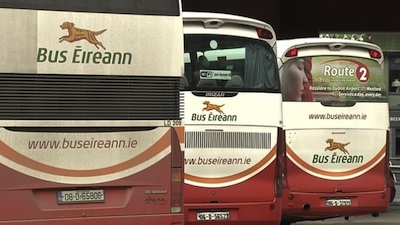
Workers at the state-owned bus company have called a nationwide industrial action which has severely reduced public transport services across the 26 Counties.
Cancellations include all Bus Éireann buses in Cork, Galway, Limerick, Clare, Kerry and in the greater Dublin area, as well as several intercity routes.
Services in Drogheda, Dundalk, Monaghan and Cavan were also expected to be disrupted, as well as cross-border coach services.
It is the first major strike by public employees in several years, and follows a lengthy tussle over the pay of the company’s workers as part of the coalition government’s austerity program.
Members of the National Bus and Rail Union (NBRU) today picketed depots, including the main bus terminal in Dublin, Busáras. Other staff, including members of other unions, were encouraged to refuse to pass picket lines, adding to disruptions.
The strike centres on a row over new measures intended to implement savings of €5m. The company says it faces potential annual losses of €16m, and told unions earlier this week it is seeking annual cost savings of €20m, with €9m coming from payroll savings.
Both sides had maintained they were available for talks in recent days, but no contact was made between the parties.
Approximately 50,000 customers usually travel on routes across the country on a Sunday. Bus Éireann, which employs 2,500 people, is a subsidiary of Coras Iompar Éireann (CIE), the state-owned transport firm.
The NBRU represents 1,000 of the workforce. Its members voted to reject cost-cutting recommendations from the Labour Court, which they claim could see some workers lose up to 4,000 euro a year in pay.
Michael Faherty, NBRU general secretary, said he has sympathy for the travelling public but said the bus firm had forced the action by implementing a cost-cutting plan which he described as a breach of contract of employment.
The government has warned the bus firm, which has lost €27m over the last five years, that it would not be financially viable if it does not impose cuts.
There are fears that the strike could be the first of many, as talks have so far failed to yield a new public service pay agreement, Croke Park II.
It is also significant that this year marks the centenary of the celebrated Dublin Lock-out, in which twenty thousand striking workers battle employers and the forces of state for the right to organise.
Sinn Féin Workers’ Rights spokesperson David Cullinane called on all sides to the dispute to return to the negotiations table urgently.
“While there is a need to ensure the ongoing viability of Bus Éireann, we are also very conscious of the fact that many of those employed by Bus Éireann are low to middle income workers, who have already taken significant hits to their income, and cannot afford to take further cuts. In that context, it is perfectly understandable that they would refuse to accept these paycuts,” he said.
“The Company has shown a lack of leadership and a lack of vision for how to restructure Bus Éireann in a long term and measured way that safeguards services, and the pay of ordinary workers. There are very likely savings to be found within the company. However any savings from the pay bill should come from the higher end of the pay scale.
“The difficulties facing Bus Éireann were not caused by the wages of its ordinary employees, and it will not be resolved by cutting their wages either.
“The government also needs to take responsibility for this situation. It has consistently under-funded public transport, and this has led to reductions in services and this current move by the company to hit ordinary workers.”
Bus Éireann urged customers to visit buseireann.ie for updates in the coming days.
![[Irish Republican News]](https://republican-news.org/graphics/title_gifs/rn.gif)
![[Irish Republican News]](https://republican-news.org/graphics/title_gifs/harp.gif)

